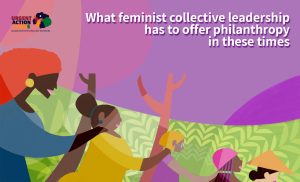These are not easy times to lead in our sector. From migration to climate to democracy, we face interconnected global crises that are deepening historic inequities and calling for new solutions. As the three Co-Executive Directors of the Urgent Action Fund – Latin America and the Caribbean (UAF-LAC), we are convinced: feminist collective leadership offers a path for organizations to ground in the strength, resilience, and wisdom we need to meet this complex moment.
While we put in place our Co-Executive Direction team just this year, UAF-LAC’s journey to feminist collective leadership began much earlier. In 2019, our beloved former executive director Tatiana Cordero Velázquez created a ‘Colectivo de Dirección,’ a space where senior staff accompanied her in her decision-making. We began to practice shared leadership, recognizing that our work is enriched by the diverse perspectives that we bring. Having this practice of feminist leadership woven into UAF-LAC’s fibers is what helped us move through the shock and grief of Tatiana’s passing in 2021. We could step in and up, not only sustaining but growing our work to resource defenders across the region in a critical time, all while centring care.
We don’t have a magic formula for feminist or collective leadership – quite the opposite, we are experimenting and learning as we go. While we continue to forge our path, we can share some early lessons for other funders who are interested in exploring this approach.
Feminist collective leadership acknowledges a fundamental truth: we are imperfect humans, and no one of us has all the answers. As co-leaders, we acknowledge our limitations and we don’t seek perfection. Single leaders can have gaps in their vision. With a collective approach, we accompany each other – asking hard questions, posing new perspectives, and making decisions together. We are spread across three countries where UAF-LAC works – Colombia, Ecuador, and Honduras – and we bring different histories and backgrounds to this work. We weave together our diverse styles and make stronger cloth.
This approach requires a willingness for loving and direct critique – not always easy for women who have been socialized to please. We have to be willing to share our opinions clearly with each other, especially when we disagree. It’s not personal; it’s about trusting that we are stronger leaders together. In fact, this is how we build the trust we need to work together well.
Centring care is at the heart of feminist collective leadership. Collective care is long at the root of UAF-LAC’s work and one of the Urgent Action Sister Funds’ feminist principles of philanthropy. We see care as a collective ancestral heritage which we keep learning and nurturing from. As we lead the organization, we continue to reflect: ‘what is the point of revolution if we can’t dance?’ As leaders, centring care means we can be vulnerable at work; when we feel overwhelmed, we are encouraged to pause, breathe, and see how we can do things differently. It also means finding joy and strength amidst constant struggle. This is essential for us as a rapid response grantmaker accompanying frontline defenders in crisis, but it applies to all funders who are navigating crises because of the world we live in, whether it is part of their missions or not.
Collective care in our institutional culture means a commitment to coherence between our external practices of accompanying grantees and our internal practices of supporting individual and collective staff wellbeing. It also means that each of us is responsible to the collective. It’s our responsibility to ask for help when we don’t know what to do. And this is where feminist collective leadership comes in: we are not alone. Building this organizational culture of care is key to our resilience and effectiveness.
A collective approach often means slowing down. Perhaps surprisingly, it also enables us to speed up. It’s true that collective processes take longer, and that can be uncomfortable sometimes. But in addition to producing better decisions and centring care, we have learned that feminist collective leadership also enables us to be more integral and comprehensive. By having these different perspectives, we can be more agile and respond more quickly in a crisis. At the end of last year, when we had a sharp increase in rapid response grants during electoral cycles that escalated anti-rights discourse across the region, we took the decision to swiftly adjust our practices so that multiple staff members could support our grantmaking team to process grants, enabling us to show up for multiple movements when they needed us.
No doubt it is simpler to follow one leader. But we have learned from the movements led by women, trans, and non-binary people that we accompany in Latin America and the Caribbean: in these times of crisis, we find greater strength and sustainability in collective models. These times require new forms of leadership. They require us to dismantle unequal power relations and find new ways forward together.
Sofía Marcía is Co-Executive Director of Grantmaking and Programs at UAF LAC. Lorena Medina is Co-Executive Director of Strategic Finances and Institutional Strengthening at UAF LAC. Terry de Vries is Co-Executive Director for Resource Mobilization and Strategic Communications at UAF LAC.
 This blog is part of a series by the Urgent Action Funds, unpacking how they practice their recently launched Sisterhood Feminist Principles of Philanthropy in their day-to-day work. The Urgent Action Funds are a global consortium of feminist funds that provide rapid and responsive support for women and LBTQI+ human rights defenders in moments of need, sustaining feminist activism by supporting the resistance and resilience of frontline defenders.
This blog is part of a series by the Urgent Action Funds, unpacking how they practice their recently launched Sisterhood Feminist Principles of Philanthropy in their day-to-day work. The Urgent Action Funds are a global consortium of feminist funds that provide rapid and responsive support for women and LBTQI+ human rights defenders in moments of need, sustaining feminist activism by supporting the resistance and resilience of frontline defenders.








Comments (1)
Good intiative